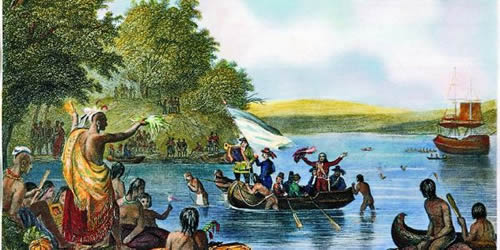
The First Americans 1607-1700
Most Americans generally assume that our history began in 1607 with the settlement of Jamestown. While that may be true, in that Jamestown was the first permanent English settlement in North America, a great deal had happened before that traditional date. The English had attempted a few settlements that failed, including the well-known one at Roanoke Island in North Carolina. The city of St. Augustine, Florida, predated the English development by over 40 years. Spanish priests and explorers also established settlements or missions in the Southwest. French, English and Dutch explorers visited various parts of North America throughout the 1500s. The Vikings had visited North America centuries earlier. All of the earliest settlements either failed or were abandoned.
This chapter focuses primarily on the English colonization of North America, including, or course, settlements composed of Germans, Dutch, Swedes and others. Here we discuss the early years when the first arrivals began building new lives in the wilderness. The land they discovered was, as is well understood, already inhabited by Indians (so named by Columbus, who thought he had landed in India), and the interaction between Europeans and Native Americans is an important and often tragic component of our development as a nation. That part of our story, it is safe to say, is still being written. The next chapter will focus on the development of relations between the colonies and the mother country, when America became a significant component of the British Empire rather than mere remote settlements spread along the coasts of North America.
The American Southwest
Some years ago while traveling through the West and Southwest to visit family, we stopped at a historic museum home in Colorado or New Mexico. The hostess asked where we were from, and when we answered, “Virginia,” she smiled and said, “This house was built years before Jamestown was settled.” It is also worth remembering that the oldest permanent settlement in America is Saint Augustine, Florida, established by Spaniards in 1565. In order to fully appreciate the broader dimensions of American history, one needs to explore the histories of Florida, Mexico, and the Southwest as far from Texas to California in addition to studies focused on the English experience. Several resources are provided below, and they in turn will lead you to others. As the population of America continues to shift from an overwhelmingly Anglo-Saxon cast to one of more diversity, the histories of countries that have sent emigrants to America, such as Ireland, Italy, China, and many other nations in Europe and Asia become more interesting. In times of modern communication devices, the world continues to shrink, and the histories and characters of other nations inevitably become more deeply entwined with our own.
This course is not include extensive treatment of the early development of the American Southwest. That region was primarily a source of exploration for Spanish and Portuguese adventurers. Neither do we cover in any detail the history of Canadian development, except as it interacts with events in British colonial America. we should keep in mind that the southern regions of North America play an increasingly important part in the development of the nation, especially after the revolution. Even during the American Revolution itself, we are accustomed to thinking that thirteen British colonies rebelled against the British Empire. In fact, there were fourteen, as the treaty that ended the Seven Years War awarded the colony of Florida to Great Britain. Not having had any interaction with British government, however, the population of Florida, which was small in any case, did not participate in the rebellion. In 1783 the Florida colony reverted to Spain.
The section immediately below this provides links to some resources regarding the development of the American Southwest.
Resources
- Spanish Colonization of the Americas
- Early Spanish Exploration of the Southwest
- History of California
- History of Florida
- History of Mexico
- History of Louisiana
- History of Texas
- Spanish Conquistadors
- Early Explorers of Canada
- The Roanoke Island Colony
- Indians of the Americas

| Sage American History Home | Colonies & Empire | Updated March 11, 2023 |
